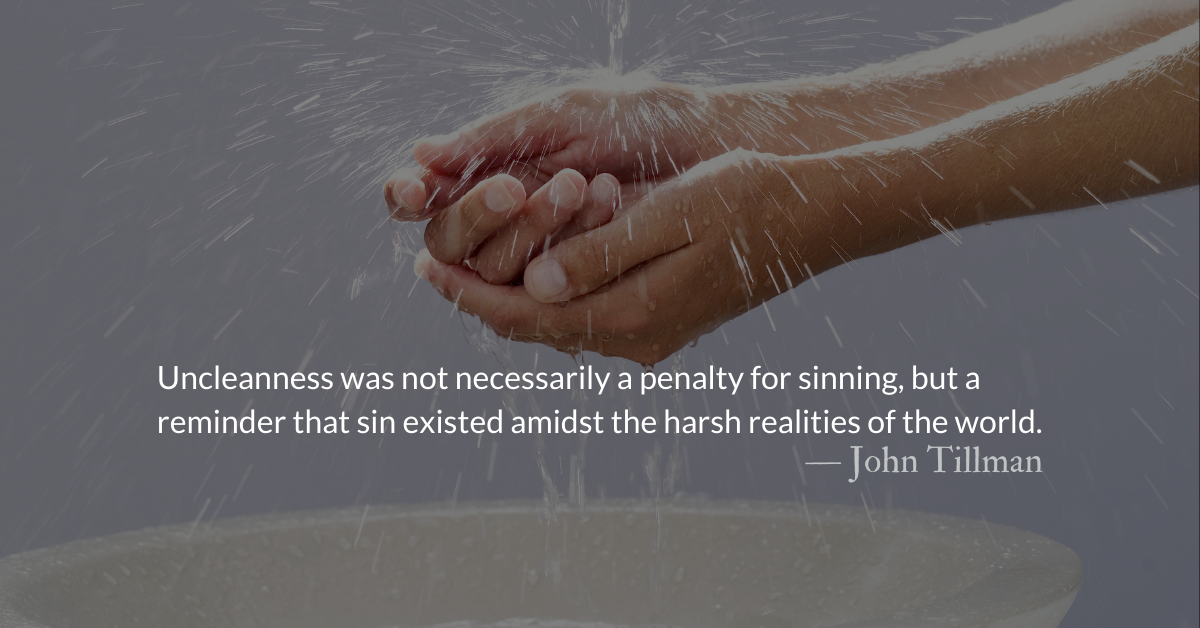Scripture Focus: Numbers 19.1-8
1 Tell the Israelites to bring you a red heifer without defect or blemish and that has never been under a yoke. 3 Give it to Eleazar the priest; it is to be taken outside the camp and slaughtered in his presence. 4 Then Eleazar the priest is to take some of its blood on his finger and sprinkle it seven times toward the front of the tent of meeting. 5 While he watches, the heifer is to be burned—its hide, flesh, blood and intestines. 6 The priest is to take some cedar wood, hyssop and scarlet wool and throw them onto the burning heifer. 7 After that, the priest must wash his clothes and bathe himself with water. He may then come into the camp, but he will be ceremonially unclean till evening. 8 The man who burns it must also wash his clothes and bathe with water, and he too will be unclean till evening.
Reflection: Water of Cleansing
By John Tillman
The water of cleansing required extraordinarily detailed criteria for the sacrifice which specified both gender and color. The ashes from this sacrifice were used to make “water of cleansing”. Whenever someone became unclean for any reason, a ritual using the water of cleansing could restore them to a state of ritual cleanliness.
One of the unique aspects of the making of the water of cleansing was that in the process of making it, the priest himself became unclean. Only by allowing himself to become unclean, could the priest carry out the rituals needed to cleanse others.
We sometimes equate being unclean with committing sin. There were sins that made one unclean, but there were also many normal parts of life which could make one unclean.
Uncleanness was not necessarily a penalty for sinning, but a reminder that sin existed amidst the harsh realities of the world. People became unclean by simply living life in a world in which death happened, for example. Mourning a relative who died would involve becoming unclean by touching and tending to the dead body. Joseph and Nicodemus and the women who attended to the body of Jesus all became ritually unclean.
Laws around ritual purity also reminded the Israelites that they were a unique and special people called to live in a unique degree of holiness.
Similarly, we are called to a unique degree of holiness, yet, there are harsh realities of life that make us unclean. We live in a world in which death happens and injustice, greed, and lust lay waste. We cannot go about our lives without being touched and made unclean by their destruction.
We, however, do not make our own water of cleansing. Our high priest, Jesus, supplies it for us through his sacrifice. He fulfilled all the requirements. He met all the criteria. He allowed himself to become defiled so that we could be made clean. Through confession and prayer, we can be cleansed daily from the uncleanness of our world.
Through our witness, our actions to aid our community, and through speaking the truth in love, we can offer those living in our unclean world the cleansing water of the gospel. From our eternal High Priest, Jesus, we have an eternal supply of the water of cleansing. Let us put it to use for our own cleansing and that of those around us.
Divine Hours Prayer: The Call to Prayer
Let my mouth be full of your praise and your glory all the day long. — Psalm 71.8
– Divine Hours prayers from The Divine Hours: Prayers for Springtime by Phyllis Tickle
Today’s Readings
Numbers 19 (Listen – 3:39)
Psalm 56-57 (Listen – 3:11)
Read more about Artful Prayers
One of the reasons that the psalms are so engaging to any reader of God’s Word is that they are works of art.
Read more about A High Priest Like No Other
Our great high priest Jesus has provided each of us with access to God’s throne of grace in any time of need.






